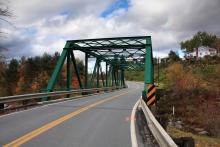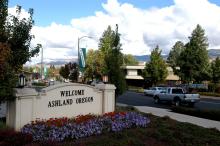An electric cooperative in Oregon is once again answering the call, fulfilling unmet needs for those living in places considered by monopoly providers as being unreachable and unlucrative. Coos-Curry Electric Cooperative (CCEC) broke ground last month on the construction of the Beacon Broadband Fiber-to-the-Home (FTTH) network, launching a project that will connect businesses and residents that have historically been left behind when it comes to broadband investment.
The project is estimated to cost $60 million, running more than 1,400 miles of fiber across Coos-Curry Electric’s service territory. The buildout time is anticipated to take three to four years.
Expanding the Economy Through Reinvestment
Coos County used to be one of the leading contributors to the growing timber industry in the early 1900s, and for a long time had a thriving fishing industry, both of which fueled the local economy. Today, the service sector and tourism drive the region.
“We will never be a timber economy again,” Paul Recanzone, general manager of Beacon Broadband told ILSR in an interview. “We’ve got to find a way to be a 21st century economy . . . we’re going to do tourism, we’re going to do work from home, we’re going to do artisan crafts where the artisans can demonstrate their wares on the Internet.”
CCEC was founded in 1939 with it’s first power lines going up in 1940 and spanning 84 miles. Today, 80 years later, it’s serving 13,000 members. As the economy shifted, CCEC saw the need for residents and emerging businesses to have reliable Internet access. But 20 percent of CCEC members received inadequate satellite or DSL Internet service.
In response CCEC created Beacon Broadband, a for-profit subsidiary of the cooperative, “to build a fiber network where no one else will go,” according to the Beacon Broadband website.
“One of the values of Coos-Curry electric is to improve the lifestyles of its members, and that value was driven into the creation of Beacon Broadband, “ Recanzone said. “We have a driving core value to improve our region in any way that we can create economic vitality in our region as much as possible.”
Beacon Broadband will borrow funding via the Cooperative Finance Corporation (CFC), but also use the $14 million it won from the recent FCC Rural Digital Opportunity Fund (RDOF) for the project.
Recanzone said that they hope the investment in broadband will have long-term, positive impacts on the economy, but that they are being mindful to make sure that it also has upfront benefits to the economy, as well.
For example, one of the local lumber companies, South Coast Lumber, already has a relationship to buy and distribute Duraline conduit, so the CCEC will source those materials from them. They’ve also put a condition in their agreement with their primary contractor for the project so that at least 15 percent of hires for the project must be local.
“We’re going to keep as much of the $14 million dollars that the federal government’s going to give us right here on the south coast of Oregon,” Recanzone said.
Where No One Else Will Go
Both Coos (pop. 64,500) and Curry (pop. 23,000) counties sit on the coast, and most of the densely populated areas line the shore of the state. But when you drive away from the water, you’ll find yourself in a forest with hills, chasms, and valleys. It wasn’t until 1962 that CCEC was the first to bring power to Agness, Oregon, which is known for its scenic hiking trails and having one of only two mail boat routes in the U.S.
The lack of level terrain contributes to the major barriers to connecting folks further inland.
Back in 2018, CCEC decided to do a feasibility study, working with an outside company which came to the conclusion that CCEC should build FTTH to the densely populated areas and provide fixed wireless in the less populated areas. But because of the rough terrain, fixed wireless was actually not all that feasible. And even if it had been, the Board decided it was not in line with the cooperative's values of universal, equitable service.

“Our board of directors at Coos-Curry Electric Cooperative had the wisdom to recognize that that was infeasible not just because of the technological aspect, but also because they had made the determination early on that if they were going to provide broadband service, they were gonna provide reasonably equitable broadband service to all of their members,” Recanzone said. “They weren’t going to create a class of haves and have nots which the incumbents had already done.”
Providing fiber to some members and fixed wireless to others would have reemphasized the sentiment that the folks further away from the coasts were not worth the investment, and that their needs could never outweigh a bottom line. Instead, Beacon Broadband will build fiber to each and every home it serves.
“17 percent of CCEC members do not have access to the Internet at their homes and another 15 percent are critically underserved,” CCEC Marketing and Membership Services Manager Jacob Knudsen told the Curry Coastal Pilot regarding a December 2018 survey of members. “Additionally nearly 60 percent of members indicated they are likely or very likely to subscribe to broadband service if offered by CCEC.”
CCEC is trying to have a balanced approach when building. They will use a weighted analysis to determine which segments of the project to prioritize, with one of the criteria being whether or not there is a lack of service.
“Financial logic would tell me to build 100 percent of this dense area right here and then take a break and collect some cash for a little while,” Recanzone told ILSR in a recent interview. “But that completely ignores the needs of the 20 percent of our members who live up these canyons and these valleys and leaves them carrying the anticipation and the hope that this project is going to do something for them and not seeing any progress.”
CCEC plans to first build out the distribution ring which will connect all of the cabinets in its anticipated service area, and then it will use its weighted analysis to determine which segments of the project to build next.
While CCEC has not yet made estimated pricing available, it does plan to offer symmetrical service tiers ranging from 100 Megabits per second (Mbps) to 1 Gigabit per second (Gbps).
As CCEC and Broadband Beacon just broke ground in April, they are in the early stages of building out the ring, and hope to connect their first residents and businesses by the end of 2021.
Header image courtesy of Beacon Broadband







